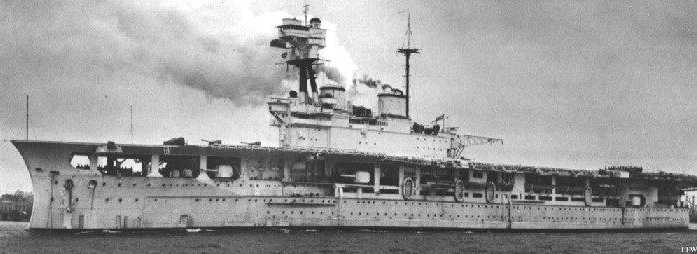

The Mark XVII was another 6" (15.2 cm) gun designed for the foreign markets, this one built by Elswick for the Chilean battleships Almirante Latorre and Almirante Cochrane. The Almirante Latorre was almost completed in 1914 at the start of World War I and shortly thereafter she was taken over by the British and renamed HMS Canada. The Almirante Cochrane lay half-completed until after the war when she was renamed HMS Eagle and converted to an aircraft carrier with these 6" (15.2 cm) guns being used as her main gun armament. HMS Canada was resold to Chile in 1920 and remained in service as Almirante Latorre until decommissioned in 1958. HMS Eagle was sunk by a German U-boat in 1942.
Of built-up construction and wire wound, generally similar to the Mark 12. Used a hand-worked Welin breech-block and an Elswick sliding hinge mechanism, with the fore portion of the breech being conical. A total of 29 guns were made.
The Mark XXI was originally ordered by Chile as a coastal defense gun and was almost identical to the Mark XVII except for a longer chamber, B tube and jacket rather than a full length jacket. Sixteen guns were made of which ten were taken over by the British Army for coast defense.
The data that follows is for the Mark XVII except where specified.
| Designation | 6"/50 (15.2 cm) BL Mark XVII 6"/50 (15.2 cm) BL Mark XXI |
|---|---|
| Ship Class Used On | Mark XVII: Canada and Eagle Mark XXI: Coast defense batteries |
| Date Of Design | 1913 |
| Date In Service | 1914 |
| Gun Weight | 19,524 lbs. (8,856 kg) |
| Gun Length oa | 310.4 in (7.885 m) |
| Bore Length | 300.0 in (7.620 m) |
| Rifling Length | N/A |
| Grooves | N/A |
| Lands | N/A |
| Twist | N/A |
| Chamber Volume | 1,650 in3 (27.04 dm3) |
| Rate Of Fire | 5 - 7 rounds per minute 1 |
- ^
The Rate of Fire figure given above is found in references for British guns of this caliber, but "Warrior to Dreadnought: Warship Development 1860-1905" quotes Jellicoe's 1906 figures for rates of fire for these guns in gunlayers' tests and in battle practice and notes that the latter figures corresponded well to those actually attained by the Japanese at Tsushima:
Gunlayers Test 12 rounds per minute Battle Practice 4 rounds per minute In "Jutland: An Analysis of the Fighting" by John Campbell, it is stated that Canada's hoists were capable of supplying about 5.5 rounds per minute, a more rapid figure than her RN contemporaries.
| Type | Bag |
|---|---|
| Projectile Types and Weights | CPC 4crh: 100 lbs. (45.3 kg) HE 4crh: 100 lbs. (45.3 kg) |
| Bursting Charge | CPC: 7.5 lbs. (3.4 kg) HE: 13.3 lbs. (6.0 kg) |
| Projectile Length | CPC: 23.5 in (59.7 cm) HE: 22.9 in (58.2 cm) |
| Propellant Charge | 28.6 lbs. (13.0 kg) MD26 28.1 lbs. (12.76 kg) SC140 |
| Muzzle Velocity | 2,905 fps (885 mps) |
| Working Pressure | N/A |
| Approximate Barrel Life | N/A |
| Ammunition stowage per gun | 200 rounds |
| Designation |
|
|---|---|
| Weight | 30,520 lbs. (13,844 kg) without shield |
| Elevation 2a | PXII: -7 / +15 degrees PXII*: -7 / +20 degrees |
| Elevation Rate | Manual operation, only |
| Train | about +80 / -80 degrees |
| Train Rate | Manual operation, only |
| Gun recoil | N/A |
- ^HMS Canada had her two after guns removed in 1916 after it was found that blast from the 14-inch "Q" turret caused problems.
- ^The shields for these guns were of a new Vickers design which allowed full elevation and depression over all arcs of fire.
Data from:
- "Warrior to Dreadnought: Warship Development 1860-1905" by D.K. Brown
- "British Battleships of World War One" by R.A. Burt
- "Jutland: An Analysis of the Fighting," "Naval Weapons of World War Two" and "British Naval Guns 1880-1945 No 12" article in "Warship Volume VIII" all by John Campbell
- "British Cruisers of World War Two" by Alan Raven and John Roberts
- "A Concentrated Effort: Royal Navy Gunnery Exercises at the End of the Great War" article by William Schleihauf in "Warship International" No. 2, 1998
- 05 April 2008
- Benchmark
- 11 February 2012
- Updated to latest template
- 04 February 2014
- Added ammunition stowage and mounting note about gun shields.
- 15 March 2016
- Corrected sinking of HMS Eagle, miscellaneous additions
